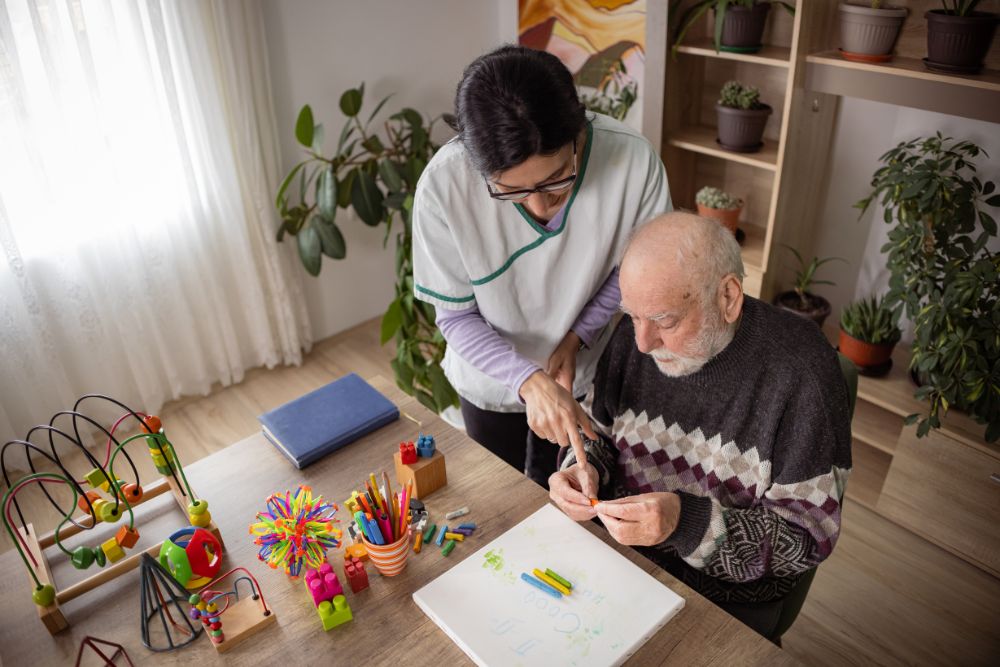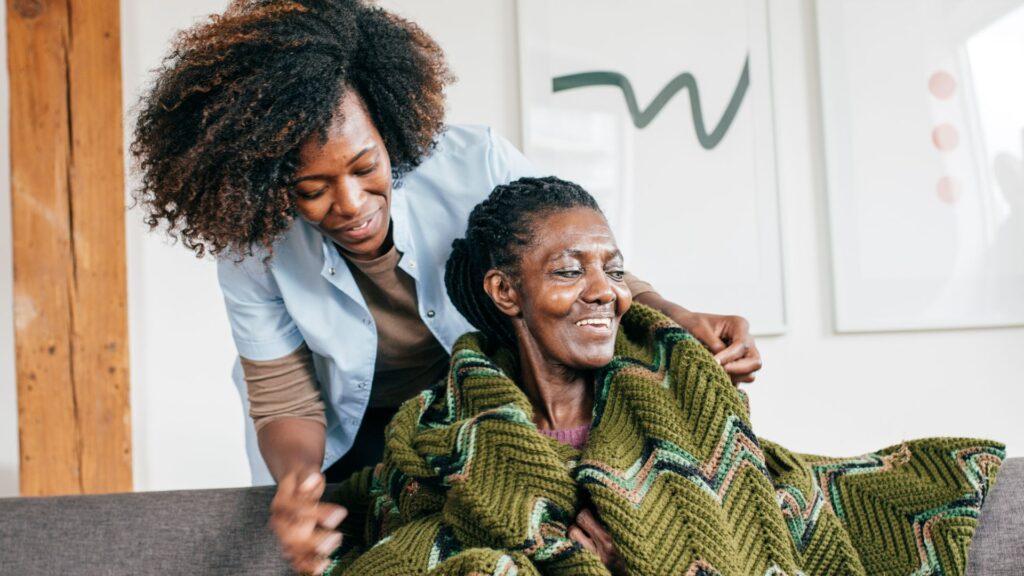
Is In-Home Care Right for Dementia Patients? What Families Should Know
Choosing the right care for a loved one with dementia can feel like navigating a maze with no clear map. Between medical recommendations, family opinions, and your own instincts, it’s easy to feel overwhelmed. In-home care is one option that blends safety, familiarity, and flexibility — but is it the right fit for your family? Here’s what you need to know before making this important decision.
Why This Question Matters More Than Ever
September is World Alzheimer’s Month — a time to raise awareness, share resources, and empower families to make informed choices. Dementia affects more than memory; it impacts daily function, emotional wellbeing, and family dynamics. The care approach you choose will shape not just your loved one’s quality of life, but the emotional health of your whole household.
To decide wisely, it’s important to first understand what in-home care actually looks like for someone living with dementia — because the details can help clarify whether it’s the right path for your family.

What Is In-Home Care for Dementia Patients?
In-home care allows your loved one to receive support in a familiar environment — their own home — rather than moving to a residential facility. It can range from a few hours of assistance each week to round-the-clock care, depending on needs.
Typical services include:
- Personal care (bathing, dressing, grooming)
- Medication reminders and management
- Meal preparation tailored to dietary needs
- Assistance with mobility and fall prevention
- Cognitive stimulation activities
- Emotional companionship and conversation
- Coordination with healthcare providers
At Empowered Endings, our in-home therapy services for dementia patients are designed to be flexible, dignified, and family-centered — supporting both the person living with dementia and the people who love them.
Once you know what’s available, the next step is to recognize the signs that it might be time to bring that extra support into your loved one’s life.
Signs In-Home Care May Be the Right Fit
While every situation is unique, families often start exploring in-home care when they notice:
Increasing Safety Concerns
- Frequent falls, wandering, or difficulty managing household tasks.
- Unsafe cooking or appliance use.
- Forgetting to lock doors or turn off the stove.
Changes in Daily Function
- Trouble with dressing, bathing, or eating.
- Decline in ability to manage medications independently.
Caregiver Burnout
- Family members feeling exhausted, overwhelmed, or unable to keep up with demands.
Hospitalizations or Health Scares
- Repeated ER visits, infections, or post-hospital recovery needs.
Emotional Wellbeing
- Signs of loneliness, anxiety, or depression in your loved one.
- Isolation from friends and community activities.
If you’re seeing these signs, it’s worth weighing the benefits of in-home care to see if they align with your loved one’s needs and your family’s capacity.

Benefits of In-Home Care for Dementia Patients
- Familiar Environment – Staying at home preserves routine and surroundings, which can reduce confusion and agitation for dementia patients.
- Personalized Attention – One-on-one care ensures your loved one’s unique needs, preferences, and personality are honored.
- Flexibility – Care schedules can be adapted as needs change — from occasional support to 24/7 coverage.
- Family Involvement – In-home care allows family members to remain close and actively involved without taking on all the day-to-day tasks.
- Reduced Hospital Readmissions – Ongoing monitoring, medication management, and home safety adaptations can prevent medical emergencies.
Of course, every option has its challenges, so understanding the potential drawbacks is just as important as recognizing the benefits.
Potential Drawbacks to Consider
- Cost: While often less expensive than full-time residential care, in-home services can still be a significant investment, especially for high-hour coverage.
- Home Setup: You may need to make modifications — grab bars, ramps, or fall prevention tools.
- Caregiver Consistency: High-quality agencies work to ensure continuity, but turnover or scheduling gaps can occur.
- Complex Medical Needs: Advanced dementia with significant behavioral challenges may eventually require specialized facility care.
Balancing these pros and cons can feel overwhelming, which is why having a clear decision-making process helps bring clarity and confidence to your choice.
How to Decide If It’s Right for Your Family
Step 1: Assess Care Needs – List daily tasks your loved one can do independently, what they need assistance with, and any safety risks.
Step 2: Evaluate Family Capacity – Consider who is available to help, their energy levels, and their other life commitments.
Step 3: Compare Care Options – Look at in-home care alongside adult day programs, assisted living, and memory care facilities.
Step 4: Consider Future Needs – Dementia is progressive. Plan for what care will look like six months, one year, and two years from now.
Step 5: Talk to Your Loved One (if possible) – Involving them in the decision can help preserve dignity and reduce resistance.
Even if you’re leaning toward in-home care, the next step is making sure you choose a provider who can meet your loved one’s needs with expertise and compassion.
Questions to Ask an In-Home Care Provider
When interviewing potential agencies or care teams, ask:
- What dementia-specific training do your caregivers receive?
- How do you handle changes in behavior or cognitive decline?
- Can we meet the caregiver before starting services?
- Do you offer therapy services, such as physical or occupational therapy, at home?
- How do you ensure safety in the home environment?
- How do you handle emergencies?
The answers you get will also help guide conversations around budget and coverage — two factors that can heavily influence your final decision.
Cost Considerations & Coverage
Costs vary based on location, level of care, and hours per week. Some services may be covered partially by:
- Long-term care insurance
- Veterans’ benefits
- State or local programs
- Private health insurance (for certain therapy services)
Pro tip: Ask for a clear written estimate that includes hourly rates, service inclusions, and any potential add-on fees.
Once you have the numbers, the final piece is understanding how the right care partner can help you get the most value from your investment — both financially and emotionally.

How Empowered Endings Supports Dementia Patients at Home
Our in-home therapy services are designed with dementia in mind. That means:
- Specialized caregiver training in memory care, communication techniques, and behavior support.
- Therapy integration to maintain mobility and cognitive stimulation.
- Family support services to guide caregivers through emotional, logistical, and practical challenges.
- Holistic care planning that considers physical health, mental wellbeing, and meaningful connection.
We know dementia care isn’t just about keeping someone safe — it’s about helping them live fully in the moments they have.
If this sounds like the kind of care your loved one deserves, there are a few simple steps you can take to move forward with confidence.
Next Steps for Families Considering In-Home Care
- Schedule an in-home assessment to identify safety risks, care needs, and routine preferences.
- Create a personalized care plan with input from your loved one, family members, and healthcare providers.
- Start with a trial period to see how your loved one adapts before committing to a long-term plan.
Taking these steps now can help you feel more prepared — and give your loved one the best possible support for the road ahead.
Final Thoughts
Choosing in-home care for a dementia patient is more than a logistical decision — it’s a commitment to preserving dignity, comfort, and connection. For many families, it’s a way to blend professional expertise with the emotional safety of home.
If you’re wondering whether in-home care is right for your loved one, we invite you to explore your options with our team. We’ll help you weigh the benefits, anticipate future needs, and create a plan that feels right for everyone involved.
Contact Empowered Endings today for a complimentary Clarity & Connection call. Let’s explore how we can make home the best place to live well with dementia.





